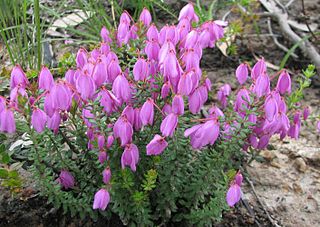
Tetratheca bauerifolia, commonly known as heath pink-bells, is a flowering plant in the family Elaeocarpaceae and is endemic to eastern Australia. It is a small compact shrub with pink-mauve flowers.

Eucalyptus insularis, commonly known as Twin Peak Island mallee, or North Twin Peak Island mallee, is a species of mallee that is endemic to a small area of southern Western Australia. It has mostly smooth bark, dull green, linear adult leaves, flower buds in group of between nine and twenty or more, white flowers and barrel-shaped fruit.
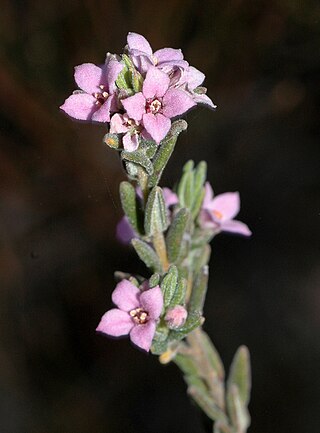
Zieria veronicea, commonly known as the pink zieria, is a plant in the citrus family Rutaceae and is endemic to south-eastern Australia. It is a small, lemon-scented shrub densely covered with velvety hairs. Up to three flowers with four pink petals appear in leaf axils in late spring.
Pultenaea insularis is a species of flowering plant in the family Fabaceae and is endemic to Kangaroo Island in South Australia. It is a spreading to prostrate shrub with wiry branches, elliptic leaves, and yellow and red flowers.
Tetratheca decora, also known as black-eyed susan, is a species of plant in the quandong family that is endemic to Australia.
Tetratheca rupicola is a species of plant in the quandong family that is endemic to Australia.
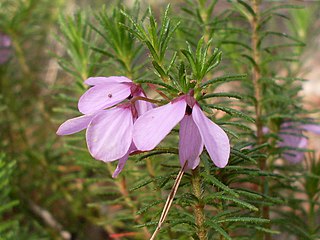
Tetratheca neglecta is a species of plant in the quandong family that is endemic to Australia.
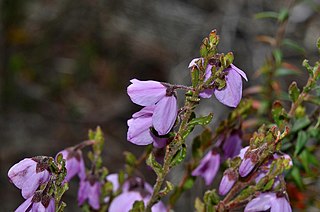
Tetratheca labillardierei, also known as Glandular Pink-Bells, is a species of plant in the quandong family that is endemic to Australia.
Tetratheca halmaturina, also known as curly pink-bells, is a species of plant in the quandong family that is endemic to Australia.
Tetratheca affinis is a species of plant in the quandong family that is endemic to Australia.

Tetratheca confertifolia is a species of flowering plant in the quandong family that is endemic to Australia.
Tetratheca pubescens is a species of flowering plant in the Elaeocarpaceae family that is endemic to Australia. It grows as a slender shrub to 60 cm in height. The flowers are white, pink or purple. It grows within the Esperance Plains, Jarrah Forest and Mallee IBRA bioregions of southwest Western Australia, on rocky hillsides, gullies and creekbanks of sand, loam or clay.
Tetratheca harperi, also known as Jackson Tetratheca, is a species of flowering plant in the quandong family that is endemic to Australia.
Tetratheca efoliata is a species of flowering plant in the quandong family that is endemic to Australia.
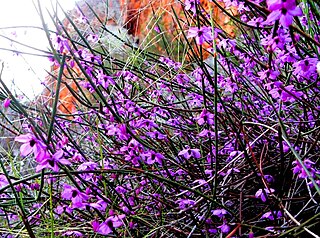
Tetratheca aphylla, also known as the Bungalbin Tetratheca, is a species of flowering plant in the quandong family that is endemic to Australia.

Tetratheca subaphylla, also known as leafless pink-bells, is a species of flowering plant in the quandong family that is endemic to Australia.

Tetratheca shiressii is a species of flowering plant in the quandong family that is endemic to Australia.
Tetratheca rubioides is a species of flowering plant in the quandong family that is endemic to Australia.

Tetratheca procumbens, also known as mountain pink-bells, is a species of flowering plant in the quandong family that is endemic to Australia.

Tetratheca ericifolia is a species of flowering plant in the quandong family that is endemic to Australia.











